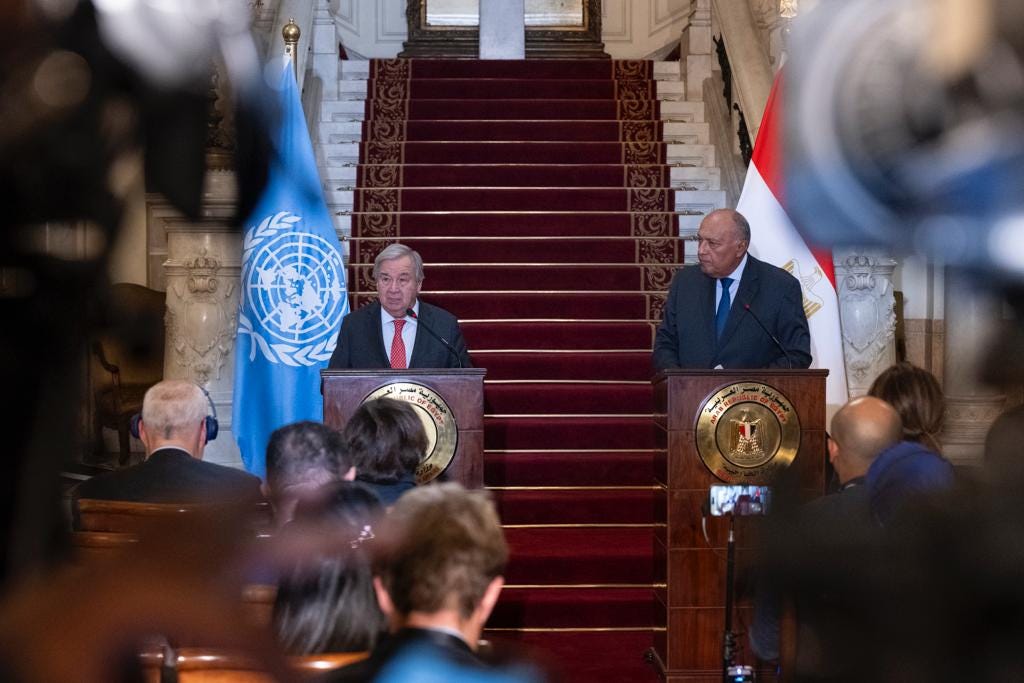The View From Egypt
Why Egypt is now the center of diplomatic activity on the Israel-Gaza conflict
Egypt has swiftly become ground zero for diplomacy on the Israel-Gaza crisis.
Moments ago, Antonio Guterres wrapped up a joint press conference with Egyptian Foreign Minister Sameh Shoukry. This follows a Sisi-Biden phone call yesterday after their in-person meeting in Amman, Jordan was cancelled. Antony Blinken was last in Cairo on Sunday. The UN’s top humanitarian official Martin Griffiths has been camped out in Egypt since Tuesday.
Why Egypt and why now? Geography and politics.
Yesterday, the Security Council failed to pass a resolution demanding a ceasefire in Israel and Gaza. The United States cast a lone veto, blocking the resolution from taking effect — even as other key allies voted for the resolution. The ostensible reason for the veto was because the resolution did not expressly endorse Israel’s inherent right to self defense. But a Security Council resolution calling for a ceasefire would have been tantamount to the Biden Administration demanding the Israeli government lay down its arms. That was not going to happen, not least while Biden was in Israel.
With a ceasefire not likely in the near future, the only plausibly route to get humanitarian relief to the besieged population of Gaza is through a single border crossing with Egypt, the Rafah Crossing. As I type, the United Nations is readying thousands of tons of aid on the Egypt side of the border, while hundreds of thousands of Gazans are stranded on the other side of the crossing in desperate need.
Until Biden’s visit yesterday, it did not seem likely that the Israeli government would let aid into Gaza. But that changed after Biden’s meeting with Netanyahu. Israel agreed, in principle, to let some aid through the Rafah Crossing. Getting the aid actually flowing requires negotiations with Egypt—hence the recent flurry of diplomatic activity. Meanwhile, President Sisi also announced that he will host an international summit on the crisis this weekend, with recent reporting suggesting that leaders from Turkey and Qatar may attend.
With Egypt suddenly the center of international diplomacy on the Israel-Gaza crisis, I wanted to get a better sense of some of the political, diplomatic and domestic considerations are driving President Sisi and his government’s decision-making at the moment. Egypt obviously has an important role to play, so what does the view look like from Egypt? To answer these questions and more I speak with Nancy Okail, President of the Center for International Policy, a think tank in D.C. We kick off discussing President Biden's visit to Israel yesterday before having a longer conversation about what the Israel-Hamas war looks like from the perspective of the Egyptian government.
Our conversation was recorded yesterday as an episode of the Global Dispatches podcast. It is obviously timely, and freely available on all podcast listening platforms.
The excerpt below is edited for clarity. The full transcript is available immediately below the fold for paying newsletter subscribers.
Nancy Okail Let's take a step back and look at the conditions in Egypt right before the attack happened. Egypt has been going through a huge economic decline, high inflation, skyrocketing prices of food and beverages and an unprecedented level of foreign debt. This is the economic situation.
al-Sisi is very aware of it and has been trying to address it through the media in various ways, i.e. that this is necessary because we're building a nation and people should tolerate these circumstances. Now, he understands that his words can only go so far if people are not able to put food on their table. Adding to that, we are weeks away from the presidential elections. Even if we know this is not going to be fair and free election, and that we know the results ahead of time, it's still a moment where there is some sort of mobilization. People are talking. People are assessing the past ten years under his rule since the military coup in 2013. So he is facing an economic crisis coupled with a political legitimacy crisis.
If we bring into the equation the sensitivity of what the Palestinians are being exposed to right now, this makes his ability to maintain stability and control very difficult. He understands also that the Arab people and the Arab population connect with each other. And the sentiments are very close. And we have seen demonstrations in Morocco,Jordan and Lebanon — and even in Turkey over the past few days.
So this is his biggest fear. He has declared his very clear opposition of the idea of moving a large number of Palestinians from Gaza to Sinai. And he unequivocally said this is not something that he would accept.
Mark Leon Goldberg You know, under normal circumstances, you would expect people to be allowed to flee across an international border to safety. But that's just not the case right now. So what is the core of Sisi’s objections to letting Gazans flee as refugees into Sinai?
Nancy Okail There are two points about the reason behind his objection. There is a declared one -- and there is a logistical capacity and competence one.




